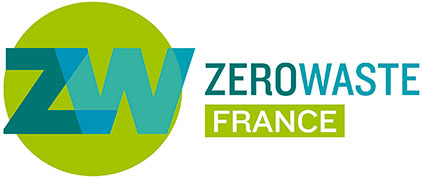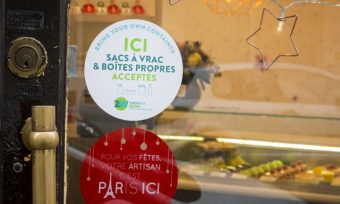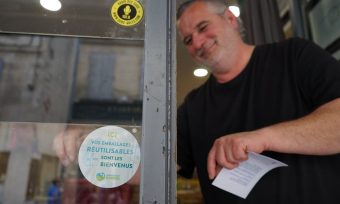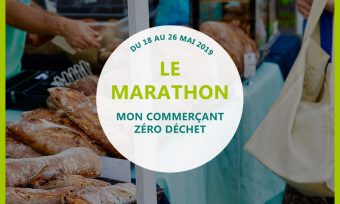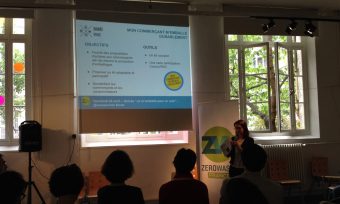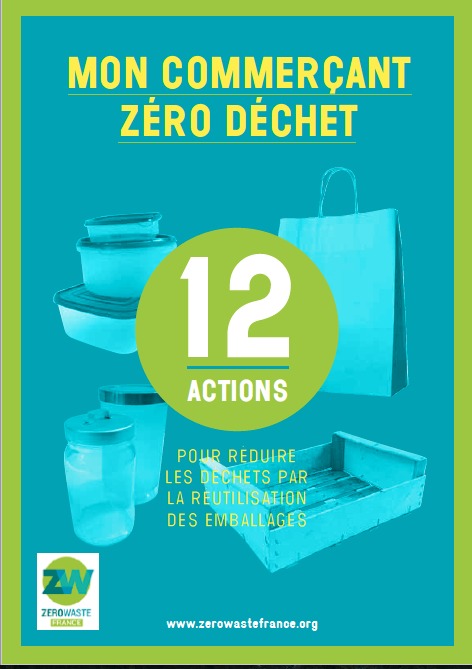My Zero Waste Merchant
Zero Waste France and its local groups have created several tools to develop the network of Zero Waste Merchants throughout France.
The Zero Waste Merchant campaign
Nearly 5 million tons of household packaging are put on the market each year in France, causing a very high consumption of natural resources and a lot of waste. More and more French people, however, no longer bear the ubiquity of packaging in their daily life: according to a study conducted by Eco-Emballages in 2013, 65% of French people say that there should be « much less » packaging and 44% believe that “we could do without it”.
Initiated by Zero Waste France in the 11th arrondissement of Paris and already deployed in several other territories, the « My zero waste merchant » operation aims to develop the use of reusable packaging and the reintroduction of the deposit in local food trade . For this, it offers an original action model that can be repeated in other territories, making it possible to create a dynamic of change at the local level. The 12 proposals for action presented in this booklet were developed from a survey of merchants who have already tried out solutions for reusing packaging.
1 – I do not automatically distribute bags, cutlery or towels
The principle
Asking this simple question, “Do you need a plastic bag?” Draws customers’ attention to the presence of this bag, which they no longer notice. This can gradually lead them to changing their habits: keep a reusable bag with them or keep reusable cutlery in the office. This action is applicable to all disposable products or objects distributed to accompany the meal: cutlery, napkins, pods of sauce, salt or sugar (seasoning can be added on site, to the customer’s taste).
The +
A classic white plastic bag costs between 1 and 5 cents and disposable utensils up to 0.5€, each undistributed unit is a small saving! Over a year, your packaging budget can be reduced considerably.
Implementation
This action does not require any material investment, but to pay off, it must be accompanied by verbal communication with your customers, possibly accompanied by a display explaining your approach. Well explained, your initiative can snowball: a company close to your business can for example invest in cutlery or reusable plates to make it available to its employees.
Feedback
The manager of the Toska bakery, located in the 20th arrondissement of Paris, in a very busy and dense district, testified: “When I stopped the systematic distribution of plastic bags, my customers were at first surprised. I simply explained to them that it was necessary to reduce my waste and make a gesture for the environment. They finally changed their habits, because what matters to them is buying good bread and not a bag.”
2 – I inform my customers to make them aware
The principle
Your customers aren’t always aware of the amount of disposable packaging they use, or the price of that packaging. Showing them the efforts made in your business to reduce the amount of waste helps raise awareness and involve them in your approach to reducing the environmental impact of your activity.
The +
By communicating with your customers, you show the example and you assert a position in favor of environmental protection which values you with a population more and more sensitive to environmental issues.
Implementation
Awareness can be done through different channels, including display. By informing about the consumption of disposable products in your store, through a message such as « Here we distribute 200 disposable bags per day, help us reduce this number! », You can react and involve your customers. You can also recall, in a few words, the impact of disposable packaging on the environment, or the fact that they represent a significant part of the price of products on sale.
3 – I give a helping hand to clients who sign up
The principle
To encourage your customers to use reusable bags and packaging, you can use the part of the savings made from not distributing plastic bags, by distributing less disposable packaging.
The +
Commercial advantage and involved in your environmental protection approach, your customers are highly loyal.
Implementation
Here are some examples of reuse incentive and retention systems:
-One free dessert for 10 reusable reusable paper bags
-Reduction of 20 cents (the cost of the tray) if the customer brings his own container
-Free exchange of custom reusable bag in store colors
-Loyalty card system offering a reduction or a free product for 10 “zero waste” passages (= without the distribution of disposable bags, towels or covered kits).
4 – I set up a deposit of boxes, jars or bottles
The principle
The deposit consists of offering your usual products in reusable packaging (boxes, jars or bottles designed for this purpose) for which your customers pay a lump sum which is returned to them when they return the empty packaging.
The +
For certain types of packaging (salad boxes, for example), the reusable version costs little more than the disposable version. The initial investment is therefore reduced and the savings significant.
Implementation
At first, you can continue to offer your customers the two types of packaging and set up an incentive system (see sheet n ° 3) to gradually encourage them to adopt the deposit. The washing and control procedures for returnable packaging must be clearly defined when the system is put in place, but do not always require additional investment or a new organization.
Feedback
Christelle, manager of the “Festival du Goût” bakery in Marsilly in Charente-Maritime, sells all her products and ingredients in bulk using a deposit system: “The deposit was not difficult to set up because we already had a dishwashing system. The savings are substantial.”
5 – I apply a deposit system on space-saving objects
The principle
The implementation of a deposit for the main food packaging (boxes, jars, bottles) can be made difficult by the lack of space in the business premises. In small spaces, you can still innovate by offering a deposit on less bulky objects such as cutlery or paper bags.
The +
The cutlery deposit can allow you to make substantial savings on your budget for purchasing disposable cutlery kits: the initial investment is moderate and washing the cutlery does not require any additional installation (see here). A deposit system also helps to retain your customers.
Implementation
For returnable packaging or objects intended for food contact (cutlery for example), washing must follow a rigorous procedure, which can be the same as that applied for kitchen utensils used daily in your business.
Feedback
All takeaways from the Boco restaurant (Paris, 1er) are packaged in returnable glass jars. Why this choice ? “The jars are pretty, efficient and ecological, and allow you to store food well. The majority of our customers react favorably to this system. ”
6 – I offer reusable bags or shopping bags
The principle
Reusable bags, possibly personalized with the logo of the shop, can be sold, offered or loaned against deposit, throughout the year or as part of a commercial operation.
The +
By offering reusable bags, you can reduce or even stop the distribution of disposable bags in your business. The personalization of the bags also makes it possible to build customer loyalty and promote your brand.
Implementation
The purchase of reusable bags can easily be shared among merchants in the same district. Do not hesitate to discuss within your merchant association or with your correspondent at the town hall the possible financial aid to be requested for this type of operation. The cost per unit of a reusable bag varies between € 0.19 and € 1.53 for plastic shopping bags and between € 1.27 and € 5.56 for organic cotton bags. The customization of the bags can be offered by the supplier.
Feedback
The drugstore Gattafoni, located in Cernay, in Alsace, offered reusable bags to all its customers at the end of the year: “We started to set up awareness actions 25 years ago, but in recent years, we note that customers are more open and more willing to act in a sustainable manner”. The operation was supported by the Chamber of Commerce and a merchant association.
7 – I accept personal containers
The principle
Customers come with their own containers (boxes, cups, bowls, thermos, etc.). You serve them directly, instead of providing them with disposable packaging.
The +
In addition to the savings made on your packaging expenses, this action allows you to retain local customers.
In practice
To warn your customers of your approach, you can choose a visual communication, by a display, and with a verbal communication towards your regular customers. Remember, if you offer a discount or other commercial advantage after a certain number of passes, let us know! To respect the obligation of traceability of your product in the absence of packaging bearing the image of your business, be sure to give the customer his receipt.
Feedback
The pizzeria Pizza e Fichi (Paris, 11e) accepts personal containers brought by its customers. Chiara, co-manager: “We did not initiate this system: it was our customers who came with their boxes and asked us if we could put their piece of pizza in it. This prevents our regulars from throwing away several disposable cardboard boxes per week! ”
8 – I sell directly to the shopping bag
The principle
Many products can be sold without packaging and placed directly in your customer’s bag, tote or shopping cart. This is the case of fruits and vegetables that are not very fragile or intended for peeling (bananas, potatoes, zucchini, apples, leeks, etc.) but also bread, if it is placed in a bag specifically for this use.
The +
Plastic bags for packaging fruits and vegetables are often very thin and cannot be reused at home. It is therefore all the more important to reduce them! For bread, the use of a reusable cotton bread bag improves storage.
In practice
To facilitate the weighing of fruits and vegetables in the absence of a paper or plastic bag, simply use a plastic basket or bin and tare the scale to weigh only their contents.
9 – I encourage the reuse of bulk bags
The principle
This is to encourage customers to reuse the paper or plastic bags used for the bulk sale of fruits and vegetables which are often little damaged after their first use. Reusable lightweight fabric or nylon bags are an even more attractive alternative, which can be suggested to customers and / or offered for sale.
The +
You are reducing your packaging budget and the impact of this action in terms of reducing waste is very important.
Implementation
This practice is common in many organic food stores. Customers come regularly with their already used sachets or with their own reusable bags.
10 – I claim returnable packaging (pallets, cases, cardboard boxes)
The principle
A food business receives very large quantities of disposable packaging daily from its suppliers. Part of this packaging, used for transport, can be reused (pallets, cases, cartons, drums, bottles). In the food industry, a plastic crate or pallet can be used between 50 and 70 times during its lifespan (around 10 years). It is therefore useful to express to your suppliers your wish to use reusable transport packaging!
The +
For the supplier, the reuse of transport packaging can represent a significant saving, once the initial investment has been amortized. For your part, this means less packaging to process, thus saving time, space and savings on your waste removal bill.
Implementation
ADEME organized a national technical day in 2010 on the reuse of industrial packaging. The proceedings of this day, available on the ADEME website, can be of great use to your suppliers in organizing their circuit for the reuse of their transport packaging (pallets, bins, boxes, etc.). NB: Several specialized companies offer rental and management solutions for reusable packaging, based on the standardization of packaging, sale in bulk or in large containers.
11 – I report unnecessary packaging
The principle
By directing your purchases towards the least packaged products and by reporting over-packaged products to your suppliers, you are acting at the source of the problem. Beyond the regulations, it is indeed the buyers who can cause manufacturers to abandon over-packaging.
The +
This action makes it possible to have a very large reduction in packaging at the source, in the short term in the choice of your purchases and in the long term in the modification of the practices of your suppliers: your return, your opinions allow them to improve. Customers’ and distributors needs and wishes for improvement is valuable for suppliers. Reducing waste is an issue all the more important for consumers as more and more municipalities rely on incentive pricing: the price of waste removal is partly based on the weight or volume of garbage.
Implementation
As soon as you spot an overpacked product, pass the information on to your sales representative, whether it is a supplier or a wholesaler.
Feedback
Cédric Pellicer, deputy manager of the Retour à la terre store (Biocoop network, Paris), monitors and limits the order of overwrapped products from suppliers: “Our employees, and even our customers, notify us of overwrapped products. We still have a lot to do with disposable packaging. We have to work more with suppliers”.
12 – I make crates, boxes, etc. available to customers.
The principle
The availability of packaging used to protect and package products (crates, boxes) near the store cash register allows customers to use these packaging for a second time, which can then be recycled.
The +
The provision of cartons and crates allows you to reduce or eliminate the distribution of plastic bags. By rendering a service to your customers, you also get rid of bulky packaging and save space.
Feedback
The manager of Maison POS (Paris, 11th arrondissement) explains his approach: “Too many empty wooden crates go into the trash; we reuse them with our customers who use them to carry their groceries. Then some use them as storage tools. ”
Regulatory Aspects
I wish to set up a deposit system. What procedures should I adopt?
To be in compliance with the regulations, you must detail all your washing (see below), verification and repackaging procedures. These last two steps must ensure that no packaging in poor condition will be reused.
What are the requirements for washing returnable packaging?
As part of a deposit system, the merchant is responsible for the cleanliness of the reused bottles, jars or boxes. Even if he asks his customers to bring them back clean, he must wash them according to a rigorous and preferably written procedure. This can be the same as that already used for cleaning kitchen utensils and therefore does not always require additional investment in new equipment. For more details on the requirements specific to each sector, you can refer to the guides to good hygiene practices validated in France by the national health security agency (ANSES) or train you in the application of the principles of the approach. « HACCP » aimed at preventing health risks.
Under what conditions can I serve a customer in his own container?
If the container used is the property of the customer, the latter is responsible for washing it, and this practice therefore does not fall under the jurisdiction of the health control authorities. However, you must refuse to serve the customer if the packaging is soiled or not designed for reuse (e.g. a fine plastic container). To ensure the traceability of your products if they are placed in a container provided to you by the customer, be sure to give them their sales receipt.
Practical tools
Zero Waste France has provided an action kit including additional sheets to the guide in order to support merchants and consumers in the My Zero Waste Merchant campaign (in French):
- The sticker to give visibility
- The poster to reflect the merchant’s commitment
- The “5 key arguments” leaflet: memo for volunteers
- An article on regulation
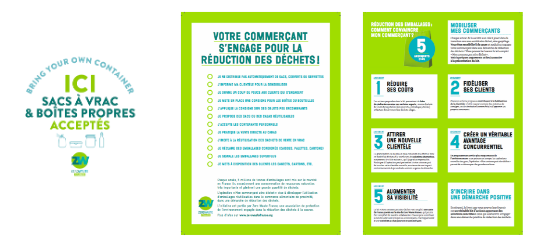
Commandez votre kit de mobilisation
Agissez à nos côtés en commandant un kit de mobilisation (autocollants, affiches, guide) afin d’aller sensibiliser vos commerçants à votre tour
Je commande mon kit et soutiens Zero Waste FranceCarte des commerçants acceptant les contenants des clients
Voir la carte en plein écran Tutoriel pour référencer un commerçantListes des commerces acceptant les contenants personnels des groupes locaux Zero Waste France
- Zero Waste Bordeaux
- Zéro Déchet Clermont-Auvergne (Puy de Dôme)
- Zéro Déchet Grenoble
- Zéro Déchet Haute-Vienne
- Zero Waste Lille
- Zéro Déchet Lyon
- Zéro Déchet Nancy
- Zéro Déchet Nice
- Zéro Déchet Nord Finistère
- Zero Waste Paris et la carte du Val de Marne
- Zero Waste Pays d’Auray
- Zéro Déchet Saint Jean d’Angély
- Zéro Déchet Strasbourg
- Zero Waste Toulouse
- Vence Zéro Déchet
Références législatives et réglementaires
- Norme EN 13429 relative aux emballages réutilisables, disponible auprès de l’Afnor
- Agence nationale de sécurité sanitaire : informations et avis sur l’hygiène alimentaire et les risques biologiques, les matériaux destinés au contact alimentaire
Initiatives impliquant des commerçants pour la préservation de l’environnement
- Plus d’idées, moins de déchets dans le Coglais – Association la Passiflore
- Opération Commerce engagé – Association Ecoscience Provence et SIVED
Related news
Zero Waste France is an organization that was founded in 1997 and is mostly financed by donations and the subscriptions of citizens and organizations. Your subscription enables us to act and to guarantee Zero Waste France's independence!
A donation of 30€ only consists of 10,20€ after tax deduction.
Find out more